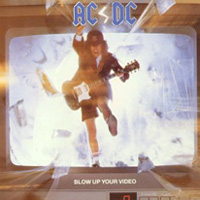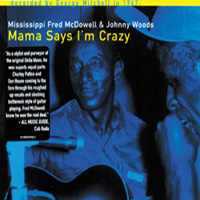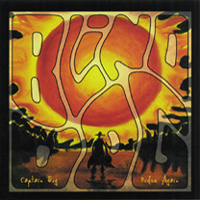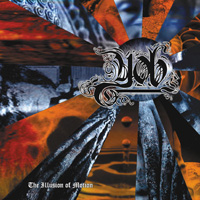 AC/DC
AC/DC
Blow Up Your Video (Epic)
by Brian Varney
The final third of Epic’s AC/DC reissues is among us, and the campaign ends, appropriately, in much the same way it began. Of course the music on these five discs sounds the same as the music on any of the other discs that were part of this reissue campaign ’cause it’s AC/DC, and they do one thing, and one thing only. Also familiar to those who, like myself, swooped down on the previous reissues is the fact that there seems to be no real logic to the order in which the discs were released. For instance, you’ve got ’74 Jailbreak, a five-song EP of Bon-era leftovers (tracks from the Aussie LPs that were left off the corresponding American releases, actually) that wasn’t released until 1984, a live album from 1978, and three of the later Brian Johnson-era studio albums.
This review is a celebration of great music, not a ponderance of record company logic, so let’s move onto what’s important here, i.e. talking about how great AC/DC was and is. Because I was an English major and therefore am forever damned to think linearly and logically, I will start with the oldest material in this group, which is the ’74 Jailbreak EP. Though it wasn’t released until 1984 as a way to satiate the band’s rabble of new fans’ appetite for “new” material, the five tracks on this EP are drawn, as I said, from the original Australian versions of the band’s early LPs, whose track listings were often different from their American counterparts. Opener “Jailbreak” came from the Aussie version of Dirty Deeds Done Dirt Cheap and, once you’ve heard it, you’ll wonder why the label didn’t think it worthy of inclusion on the American LP. Thanks mostly to its inclusion on this EP, the song has since come to be regarded (quite rightly so) as one of the band’s finest songs, and is apparently a frequent inclusion in live sets to this day. The remaining four tracks appeared on the Australian version of High Voltage, but not its U.S. counterpart. Fine though the U.S. version is, it certainly could’ve benefited from the inclusion of any of these songs, particularly the band’s crackling take on blues classic “Baby Please Don’t Go,” which has perhaps more swing than any of the many versions of the song save Them’s definitive take.
If You Want Blood, You’ve Got It, recorded live in 1978, shows the band applying the same ferocious sense of swing to their originals, most of them notably hotter than the already darn-tootin’ original versions. If anybody tries to dispute the fact that R&B music lies at the heart of what AC/DC does, they only need hear these versions of these songs to be irrefutably proved wrong. This fucker is on a whole lotta smart folks’ short list for best live album of all time for a reason. You know you’re in for a high-energy live set when the friggin’ opener is the berserk “Riff Raff,” this version considerably crazier than the already hepped-up studio version that appeared on Powerage. Shit, the band is so hot on this set that I don’t even mind the interminable “The Jack,” never one of my favorites. Any calcification that may have occurred during the brief slowdown is immediately torn away as the band follows up with the devastating rabbit-punch of back-to-back “Problem Child” and “Whole Lotta Rosie,” Cliff Williams’s buoyant bass the secret burst of nitrous that pushes the band beyond any and all known landspeed records.
What happened next has already been covered in the other batches of reissues, so we will skip Bon Scott’s death, the hiring of replacement vocalist Brian Johnson, and the band’s subsequent meteoric rise to be the most popular band in the world. Following a couple of hugely successful tours, the inevitable next step in any rock ‘n’ roll saga, this one included, is nostalgia for the simpler times, a “return to roots,” if you will. Which is sort of a ludicrous concept in relation to AC/DC, since all they’ve ever done is make simple three-chord rock music. Yeah, the Beatles had their “return to roots” moment with Abbey Road and the Stones had theirs with “Jumpin’ Jack Flash” and Beggar’s Banquet, but both of these bands were coming off of incredibly self-indulgent psychedelic phases in which they had strayed from their rock ‘n’ roll roots. AC/DC was coming off of For Those About To Rock, We Salute You which, fine album though it is, sounded like the album that had come before it, and the one before that as well. Perhaps the band merely wanted to get away from the big-budget stage productions with cannons, etc. – I didn’t see them on the Flick of the Switch tour, so I don’t know if they did. The fact that it’s self-produced, and possibly the album’s bare-bones black and white cover art, are about the only thing that separated Flick of the Switch from its predecessors, and that’s just the way it’s supposed to be, thanks. Though fans generally tend to regard this album as the beginning of the band’s end, it’s actually quite a strong album: Fine performances (natch), strong songs like the title track, the slide guitar-driven boogie of “Badlands,” and the bludgeoning closer “Brain Shake” indicate that it’s ripe for a rediscovery and a subsequent “I always loved that album” air of condescension from snobs who talked shit about this album, most likely without having ever heard it. To be honest, I don’t think I’d ever heard Flick of the Switch before this reissue, so it was a very pleasant surprise indeed to discover just how good it is.
The 1985 follow-up, Fly on the Wall, introduces new drummer Simon Wright, and the Angus ‘n’ Malcolm production shows concessions to the era’s production practices (most obviously in the reverbed-to-hell-and-back drum sound), but otherwise it’s business as usual. And though the aforementioned naysayers who declared Flick of the Switch the beginning of the end will often point to Fly on the Wall as further proof of the band’s decline, it, like its predecessor, is actually much better than its reputation would indicate. Yeah, the drum sound immediately screams “mid-’80s,” but it also includes “Shake Your Foundations” and “Sink the Pink,” both of which belong on a band best-of compilation. Closer “Send for the Man,” while it may lack the grinning malice of something like “Night Prowler,” is nevertheless full of the malevolence you demand from AC/DC at this tempo.
Considering it’s the first AC/DC album I bought new, you’d think Blow Up Your Video would hold a dearer place in my heart than it does. Even my youthful exuberance for all things AC/DC back in 1988 could not hide my disappointment with this album upon release, and it was filed away almost immediately, not to be heard again for 15 or so years (i.e. now). Apparently, I’m not alone, as this is generally considered the band’s nadir. However, as I’ve said in several different ways throughout the review of these and the previous reissues, there’s really no such thing as a truly bad AC/DC album, only lesser ones. Because they’re so locked into the one thing they do, anyone who enjoys the band will enjoy anything they do that adheres to said formula, from which they have yet to deviate.
On the surface, Blow Up Your Video had a lot going for it, the most obvious being that it was the band’s reunion with producers Harry Vanda and George Young, who produced the band’s first five albums. Those looking for a return to the majestic production of Powerage or Let There Be Rock were probably a bit let down, since this is pretty much your standard late ’80s hard rock production, complete with tin-can-reverb-hell drum sound. In spite of this, and my memories of my disappointment with my initial encounter, I gave it another shot and, as you can probably guess by now, I think it’s pretty good. “That’s the Way I Wanna Rock ‘n’ Roll,” approximately the band’s 357,985th ode to the joys of rock ‘n’ roll, is just as enjoyable as the previous 357,984, thanks mostly to the ingeniously catchy riff and Brian Johnson’s lyrical nods to ’50s classics like “Be Bop a Lula.” Opener “Heatseeker” was apparently the single, and though I have no memory of having heard it on the radio at the time, it’s good enough to make me wonder why it didn’t catch my attention. I mean, yeah, it’s just the same old shit, but if you or I didn’t like said shit, you wouldn’t be reading this and I wouldn’t be writing it, so let’s just admit that “Nick of Time” is a great song and AC/DC is the greatest rock ‘n’ roll band in the world (sorry Stones, but they left you in the dust decades ago) regardless of what pantywaist music critics think, OK? OK.
(www.acdcrocks.com)



